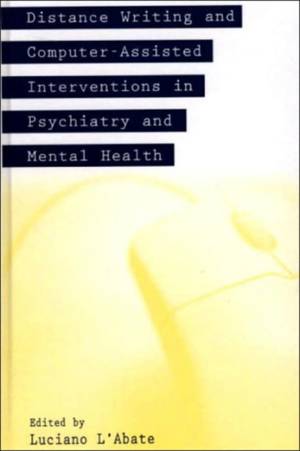
- Afhalen na 1 uur in een winkel met voorraad
- Gratis thuislevering in België vanaf € 30
- Ruim aanbod met 7 miljoen producten
- Afhalen na 1 uur in een winkel met voorraad
- Gratis thuislevering in België vanaf € 30
- Ruim aanbod met 7 miljoen producten
Distance Writing and Computer-Assisted Interventions in Psychiatry and Mental Health
Luciano L'AbateOmschrijving
Directed to mental health professionals and graduate students in the mental health disciplines, we present a new way to augment the cost-effectiveness of current face-to-face (f2f) mental health based on talk, and, offer an alternative in primary, secondary, and tertiary prevention approaches. Distance writing (DW) and computer-assisted interventions (CAI) through the Internet opens up new vistas to those unable to be reached using traditional talk-based f2f approaches, i.e., living abroad, handicapped, the military, missionary families, Peace Corps volunteers, English speaking respondents (individuals, couples, and families), and most importantly incarcerated prisoners who do not seem to improve through conventional verbal, f2f approaches.
DW and CAI vary in their structure (from high to low) and in levels of goals, content, specificity, and abstraction. Positive research evidence finds that DW and CAI is effective and actually cost-effective, with relatively healthy undergraduates, psychiatric outpatients, incarcerated felons, and physically handicapped patients supporting the use of this relatively new approach. This evolutionary step or paradigmatic shift cannot take place overnight, professionals suspicious of this new technology, will find this work a way to assuage their fears and help start this new cure on an experiential basis, utilizing structured interviews before starting to use writing and CAI at a distance. It presents an ample field of applications that will make research more cost-effective than traditional talk-based, f2f approaches. DW/CAI represents one way in which MH professionals can progress to meet managed care companies demands for accountability. Progress in most realms of business, science, education, law is based on the written record. The talking cure has occupied the last century as one of the greatest advances in how to help distressed people. By the same token, the writing cure represents the breakthrough for this coming century. Up to the present talk was conceived as the main if not the only vehicle of communication and healing. Adding DW/CAI to preventive and therapeutic armamentaria represents a distinct advance in how MH services will be delivered, to be accountable for professionals, and to conduct research economically, i. e., doing well while doing good. This work, therefore, combines theory, research, and practice to demonstrate the many advantages that DW/CAI offers as either an alternative, substitute, or supplement for talk therapy. Cyberspace is coming, instead of seeing it as a threat to traditional talk-based f2f practices, MH professionals will have to start to see the advantages of working with patients, clients, subjects, or respondents at a distance. Ethical and professional issues will present themselves in this new way, and should not detract professionals from starting this relatively new way to intervene, and to ensure that this new way to practice is delivered compassionately, responsibly, and effectively.Specificaties
Betrokkenen
- Auteur(s):
- Uitgeverij:
Inhoud
- Aantal bladzijden:
- 248
- Taal:
- Engels
- Reeks:
Eigenschappen
- Productcode (EAN):
- 9781567505245
- Verschijningsdatum:
- 21/11/2000
- Uitvoering:
- Paperback
- Formaat:
- Trade paperback (VS)
- Afmetingen:
- 156 mm x 234 mm
- Gewicht:
- 358 g

Alleen bij Standaard Boekhandel
Beoordelingen
We publiceren alleen reviews die voldoen aan de voorwaarden voor reviews. Bekijk onze voorwaarden voor reviews.











